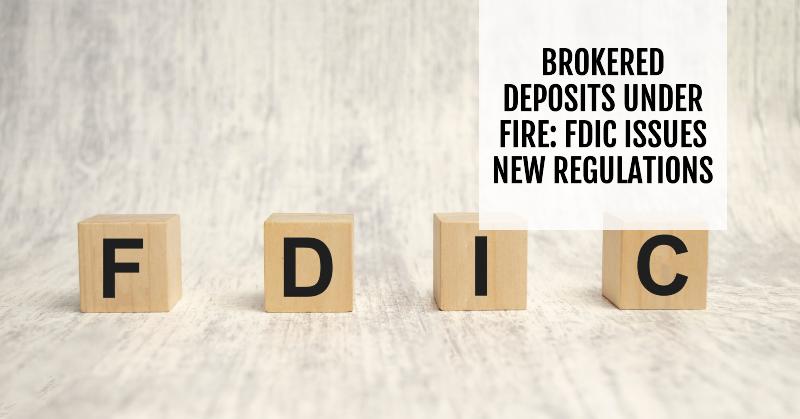In a significant development for the banking industry, the FDIC Board approved a proposed rule to revise brokered deposit regulations on July 26, 2024. This change promises to reshape how banks engage with these deposits, addressing longstanding concerns regarding the safety and soundness of financial institutions. As we delve deeper into this topic, it becomes clear that this proposal is not merely a regulatory tweak; it represents a pivotal shift in the FDIC’s approach to managing brokered deposits, which have gained prominence in recent years.
FDIC Board Approves Proposed Rule to Revise Brokered Deposit Regulations
Understanding Brokered Deposits
Brokered deposits refer to funds obtained by banks through third-party intermediaries or brokers. These deposits are attractive to banks because they often come with higher interest rates, helping institutions boost their liquidity. However, the FDIC has historically viewed brokered deposits with caution due to their potential to destabilize banks during times of financial stress.
The new proposed rule is aimed at revising the definition and treatment of brokered deposits, reducing some of the existing regulatory burdens while enhancing the overall regulatory framework.
Key Features of the Proposed Rule
The FDIC's proposed rule includes several crucial components that stakeholders in the banking industry need to understand:
- Updated Definition: The proposal introduces a more nuanced definition of what constitutes a brokered deposit. This is intended to clarify who qualifies as a broker and can thus facilitate these deposits.
- Increased Transparency: Banks are expected to provide more detailed disclosures regarding their use of brokered deposits. This transparency is designed to ensure that regulators can adequately assess the health and risk profile of financial institutions.
- Regulatory Flexibility: The proposed rule allows for more flexibility regarding the holding of brokered deposits. Specifically, it addresses the conditions under which banks can accept these deposits without being classified as ‘troubled' institutions.
- Public Involvement: The FDIC is actively seeking public comments on the proposed rule to incorporate feedback from various stakeholders, including banks, regulators, and consumers. This participatory approach aims to refine the final regulation and ensure it addresses the needs of all parties involved.
Why This Revision Matters?
The FDIC's decision to revise brokered deposit regulations has far-reaching implications.
For Banks: Navigating New Opportunities
For banks, these changes open the door to greater access to funds, which could, in turn, facilitate lending and growth. With lower barriers to accepting brokered deposits, institutions can better manage their liquidity needs without the fear of stringent penalties that have historically accompanied brokered deposits.
For Regulators: Addressing Systemic Risks
From a regulatory perspective, the new proposal aims to strike a balance between fostering bank growth and mitigating systemic risks. By imposing more stringent disclosure requirements, regulators believe they can keep a closer eye on banks’ reliance on brokered deposits, ensuring that they do not become overly dependent on potentially volatile funding sources.
For Consumers: Enhanced Stability
For consumers, the proposed rule could ultimately lead to enhanced stability within the banking system. With clearer regulations and monitoring, there is an expectation that banks will operate more safely and soundly, protecting consumers' deposits and maintaining public confidence in the financial system.
What Stakeholders Are Saying
In the aftermath of the FDIC's announcement, reactions from the banking community and regulatory bodies have varied. Some bank officials have praised the proposed changes, highlighting the potential for increased liquidity and competitiveness.
Conversely, critics argue that relaxing brokered deposit regulations could pave the way for risky behavior among banks, reminiscent of practices that contributed to past financial crises. This skepticism reflects a broader concern about ensuring that financial institutions remain stable amid efforts to promote growth.
The Road Ahead: What to Expect
Moving forward, the FDIC has opened the floor for public comments on the proposed rule, which will remain open for a designated period. Stakeholders are encouraged to express their views, which will be taken into account as regulators finalize the rule.
The comments received will play a significant role in shaping the final legislation. It is essential for stakeholders—ranging from banking associations to consumer advocate groups—to engage actively in this process.
Timeline for Implementation
Although the FDIC has approved the proposal, the implementation timeline remains to be officially published. Typically, once comments are reviewed, and final adjustments are made to the rule, a specific implementation timeline will be released. Banks will need to prepare for potential changes, ensuring they have the necessary systems in place to comply with any new requirements.
Conclusion: A Step Towards Enhanced Banking Regulation
The FDIC Board’s approval of the proposed rule to revise brokered deposit regulations marks a significant milestone in banking regulation. By clarifying definitions, increasing transparency, and providing more flexibility for banks, the rule aims to foster a healthier banking environment while safeguarding against systemic risks.
For readers who are stakeholders in the financial industry or simply interested in banking regulations, this development is crucial. It reflects the evolving landscape of financial regulation—one that balances the need for growth with the imperative of safety in the tumultuous waters of the financial world.
As we await further developments, it's clear that active engagement and scrutiny from all corners of the industry will be vital in shaping the final outcome. When it comes to our banking system, both innovation and security must go hand in hand—an equilibrium that this proposed rule aims to achieve.
For more information on this foundational regulation update, you can visit the FDIC official press release.
ALSO READ:
- Which Banks Are in Danger of Failing or Collapse (2024)
- List of FDIC-Insured Banks in 2024: Is Your Bank Insured?
- 10 Ways to Insure Deposits Beyond the FDIC Limit of $250,000
- Bank Insurance: How Does FDIC Deposit Insurance Work?
- List of Recent Failed Banks in the United States (2023-2024)
- Is My Money Safe in the Bank in 2024?
- US Banking System Insolvency: Is a Crisis Coming Up?




